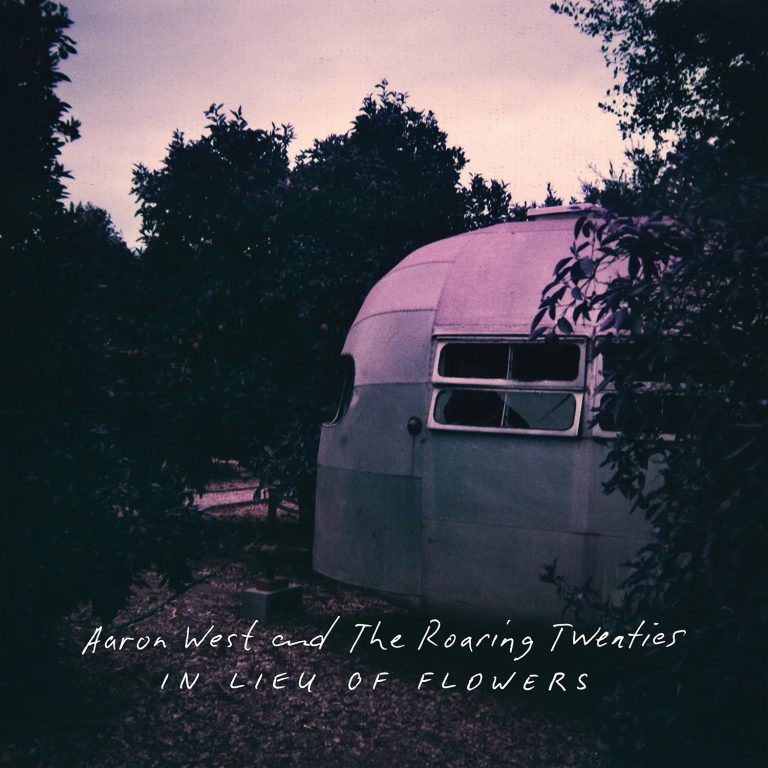It’s been five years since we last heard from Dan Campbell’s hard-done by alter-ego, Aaron West. Designed as a “character study through music”, the three-album project has mainly served to showcase what happens to someone after life throws everything it’s got at someone. When we met Aaron a decade ago, he had recently suffered his father’s bereavement, his wife’s miscarriage and their subsequent divorce. After a hopeful reprieve via 2019’s Routine Maintenance we’ve now returned firmly to the territory of despair. On In Lieu Of Flowers, COVID-19 lockdowns and quarantine provide a suitably bleak backdrop to their narrator’s tails of spiralling alcoholism and isolation.
“We talk about the future / Like we’re begging it to kick our fucking teeth it” cries The Wonder Years frontman on “Roman Candles”. The world begins shutting down in real time, tour dates get abruptly cancelled and West’s mother, a nurse, offers a dispatch from hospital where “every shift feels like a curse”. Despite this, the music rises with an undeniable air of victory as driving drums and guitars crescendo alongside horn flourishes. Like on much of In Lieu of Flowers, West can’t help but be awestruck by the unlikely triumph of still being alive amidst the wreckage.
In Lieu of Flowers very much feels like a soundtrack for the end of the world, which is only heightened by Campbell’s bombing, scratchy, quintessentially pop-punk vocals, and the imposing sound of his 15-piece band. On album centrepiece “Paying Bills At The End of The World”, Campbell offers another dispatch from spring 2020, “No one told the birds the world was ending / So they keep singing like it’s Spring”. Boasting the album’s most anthemic chorus, and prominent pedal steel guitar which heightens the sorrow, “Paying Bills” is equally concerned with small mundanities as it is with apocalyptic visions. Across four minutes, dreams of dying, quips about Jesus “running late”, an inability to afford health insurance, “shit” gas station coffee and gruelling manual labour are given voice. In theory, the prospect of the world as we know it ending should make otherwise every day disappointments seem insignificant, but more often that not it just makes them all the more crushing.
As Flowers progresses, devastation gives way to nihilism as West relapses into alcoholism – leading to devastating admissions like “all I do is lose” on the slow burn “Whiplash”, and “I’m an albatross” on the track of the same name. “Fuck building a bridge / I’m burning it down”, he declares on frenetic pop-punk anthem “Spitting In The Wind”, a song which captures the moment where exhaustion and burnout give way to total surrender to one’s worst, most destructive impulses.
Flowers is supposedly the final instalment in the Aaron West trilogy, and while there may be no straightforwardly happy ending for the character of West, we are left with a roadmap to recovery. On “Running Out of Excuses”, West collapses the album’s entire narrative into five minutes; mourning “lost youth” and causing further destruction before checking into rehab and promising better (“I’m digging out, I’m gonna set it straight”).
Whether West can hack it or not is a question left to listeners to decide. Certainly, the narrative of Flowers is not linear or straightforward – even when West arrives home to get clean, he’s sneaking bottles of Jim Beam off the plane – but a glimmer of hope remains until the very end.
On closer “Dead Leaves”, West unexpectedly sees his ex-wife pushing a stroller while the shadows obscure him from view. “The gold glare hides me / I could be anybody”, he declares while standing “paralysed on the street”. It’s one of countless devastating admissions delivered across the LP’s 43 minutes, but it’s one of the more promising too. Hidden from view, unbeknownst to those around him, West really could be anybody he wanted to be from here on out. A world of possibilities, simultaneously terrifying and mesmerising, awaits just around the corner for West, just outside of the listener’s view. This is, and always has been, the promise of recovery – if you can hold on to it.

